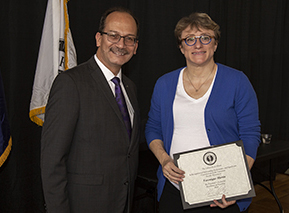UAlbany, French Students Take Turns as Experts and Learners in ‘Conversation’
.jpg) |
|
Lionel Tchatchoua Ngaleu, at right, speaks by Skype with a student from the Université de Haute-Alsace in France, one of three intercultural conversations she took part in this semester in her French Studies course. (Photo by Sarah O'Carroll)
|
ALBANY, N.Y. (Nov. 26, 2019) — Share your thoughts. Share your culture. Share your language.
Through the experience and initiative of French Studies Lecturer Véronique Martin, students in her upper level course “French Conversation” are achieving all three objectives, enhancing their language studies by way of three sessions per semester devoted to online webcasts with students in France. These interactions are a good fit with the University’s priorities of greater internationalization, engagement, and appreciation of diversity.
“French Conversation" was a mainstay in Language, Literatures and Cultures in 2004 when Martin took over this intensive practice course, which focuses on developing listening and communicative skills in French. At the time, however, it did so solely by students speaking French to each other in the classroom.
 |
|
President Rodríguez presents Véronique Martin with her 2018 Excellence in Teaching award. (Photo by Brian Busher)
|
Martin, a 2018 UAlbany Excellence in Teaching award winner, recalled intercultural conversations with students from different backgrounds in her own schooling, and sought to incorporate it here. “Growing up in France, I took part in actual physical class-to-class exchanges in the secondary school system,” she said. “These ‘class twinnings’ are common in Europe and I saw the intercultural opportunities they provided. That is why I started integrating them into my course here, with the support of the French Studies program.”
During three webcasting sessions in the semester, Martin’s students pair up via Skype with French masters students from the Université de Haute-Alsace who are enrolled in an English conversation course. They bring to the conversations the knowledge they’ve gained through class readings on French culture and also current events involving public policy issues.
“Some of this content is used to initiate discussions,” said Martin. “There are two main learning objectives: the development of French language skills and achieving intercultural communicative competence — the ability and skills to understand and interact with people from other cultures.
Exchanges Well Worth the Logistics Challenge
Martin noted that the setting up of the exchanges is challenging because the students are in different time zones and have different university calendars. “But the benefits of a class-to-class exchange outweigh the challenges,” she said. “It works well because students are both learners and experts. My students are the ‘experts’ when the conversation is in English, lending help and support to their French partners, and then they change roles when the conversation switches to French and they become the ‘learners,’ supported by the French students.
“We call that a synchronous, or ‘real time,’ symmetrical exchange because the two sides are in the same learning situation.”
Students in Martin’s class appreciate the added intercultural experience. “I think what I picked up most from this exchange was how to have a casual conversation in French,” said Sarah Hulbert, a junior from Albany and linguistics major. “With less structure, the flow of things seems more natural, and it was also fun being able to chat with foreign students. I don't think I can express enough how beneficial I thought it was in terms of providing a comfortable learning opportunity for both sides.
“I've done other sorts of video calls with native speakers, but it always felt more structured and overall more awkward. I think the unique nature of having it split between talking to a native speaker and then being the native speaker really takes the edge off my nerves because it kind of puts everyone in the same position and understanding of the challenge of learning a second language.”
Hulbert engaged with her French counterpart “in a laid back way” on such debate topics as their countries’ work cultures, higher education and the environment.
UAlbany senior Lionel Tchatchoua Ngaleu, a biology major and French minor from Rexford, spoke with her French partner, who is Vietnamese and Moroccan, about their respective educational systems. “I was really astonished to discover that France has such cheap tuition rates,” she said.
“Overall, it was truly a fun and educational experience, the kind I would wish for all other students in their studies,” she said.
![]() For more news, subscribe to UAlbany's RSS headline feeds
For more news, subscribe to UAlbany's RSS headline feeds
A comprehensive public research university, the University at Albany-SUNY offers more than 120 undergraduate majors and minors and 125 master's, doctoral and graduate certificate programs. UAlbany is a leader among all New York State colleges and universities in such diverse fields as atmospheric and environmental sciences, business, education, public health,health sciences, criminal justice, emergency preparedness, engineering and applied sciences, informatics, public administration, social welfare and sociology, taught by an extensive roster of faculty experts. It also offers expanded academic and research opportunities for students through an affiliation with Albany Law School. With a curriculum enhanced by 600 study-abroad opportunities, UAlbany launches great careers.


